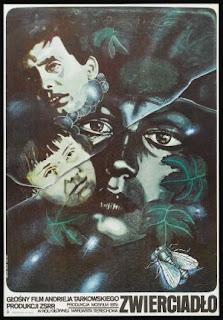 This must be one of the most beautiful looking films ever made; the photography of nature is absolutely magical, and the portrayal of time, and jumps in time, are the most effectively disorienting of any of Tarkovsky’s films. I don’t know what he does, if he artificially created the gusts of wind that pause time at exactly the right moments, but the flames, rains, and winds seem to be on their very best behavior for this film. Surreal moments are not only more plentiful than any of his other films, but also more believable in this film versus, say, the final scene of Stalker when the glasses are telekinetically guided across a table. The woman floating in her sleep towards the end of Mirror is realistic enough that it wouldn’t be out of place in a J-Horror film; it’s more than a little bit terrifying (not to mention the similar, earlier scene in which the same woman raises her wet hair about of the tub, and seems to be simultaneously moving forward and backward in time as the ceiling crumbles around her. I was especially drawn to the visuals of the film because, on first viewing, this film is so difficult to assemble and make sense of, that I gave up on comprehension and just stared in awe at the eye candy. The shifts through time, multiple roles for the actors, and self-references made me think of INLAND EMPIRE, a film that, formally, I think has a lot in common with this one.
This must be one of the most beautiful looking films ever made; the photography of nature is absolutely magical, and the portrayal of time, and jumps in time, are the most effectively disorienting of any of Tarkovsky’s films. I don’t know what he does, if he artificially created the gusts of wind that pause time at exactly the right moments, but the flames, rains, and winds seem to be on their very best behavior for this film. Surreal moments are not only more plentiful than any of his other films, but also more believable in this film versus, say, the final scene of Stalker when the glasses are telekinetically guided across a table. The woman floating in her sleep towards the end of Mirror is realistic enough that it wouldn’t be out of place in a J-Horror film; it’s more than a little bit terrifying (not to mention the similar, earlier scene in which the same woman raises her wet hair about of the tub, and seems to be simultaneously moving forward and backward in time as the ceiling crumbles around her. I was especially drawn to the visuals of the film because, on first viewing, this film is so difficult to assemble and make sense of, that I gave up on comprehension and just stared in awe at the eye candy. The shifts through time, multiple roles for the actors, and self-references made me think of INLAND EMPIRE, a film that, formally, I think has a lot in common with this one.
Speaking of David Lynch, I was also reminded of The Straight Story when the we see the burning home (as well as Days of Heaven). As Mirror is a film heavily attuned to the feelings of childhood and memory, I thought it was an interesting thematic symbol, having a burning home as a representation of a troubled childhood, that this film shared with Straight Story. Alvin Straight loses control of his lawn mower when the brakes fail and races violently down a hill. In the background a large house is in flames, and grabs Straight’s attention. The burning home represented the incident in which his (slightly mentally disabled) daughter Rose lost the rights to care for her children after she was blamed for a house fire. The flames of the homes in both of these films are filmed very Romantically , suggesting a disturbing correlation pertaining to the relationships between parents and their children. If Mirror is a telling of childhood, which I believe it obviously is, it is certainly not a pretty one.
So much of the film beckons for deeper readings and interpretations, like the opening scene with the seance, and of course the mirrors, that I would just make a fool of myself to act like I can write something insightful about it. But it would be oh so nice if Kino could take their feet off of their greedy hands and give the rights to this and every Tarkovsky film they have over to someone who will transfer it for Blu-ray. It would make revisiting it even more exciting.
